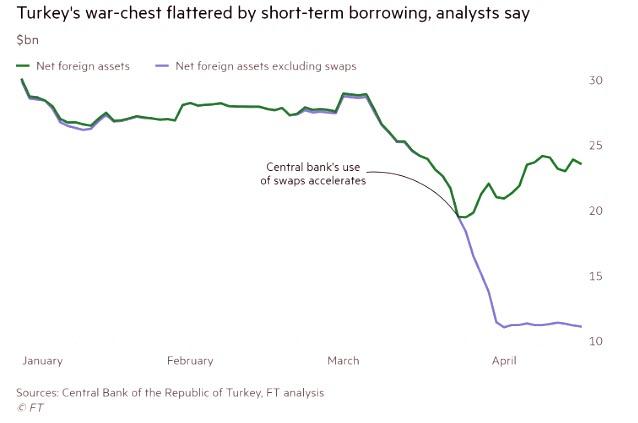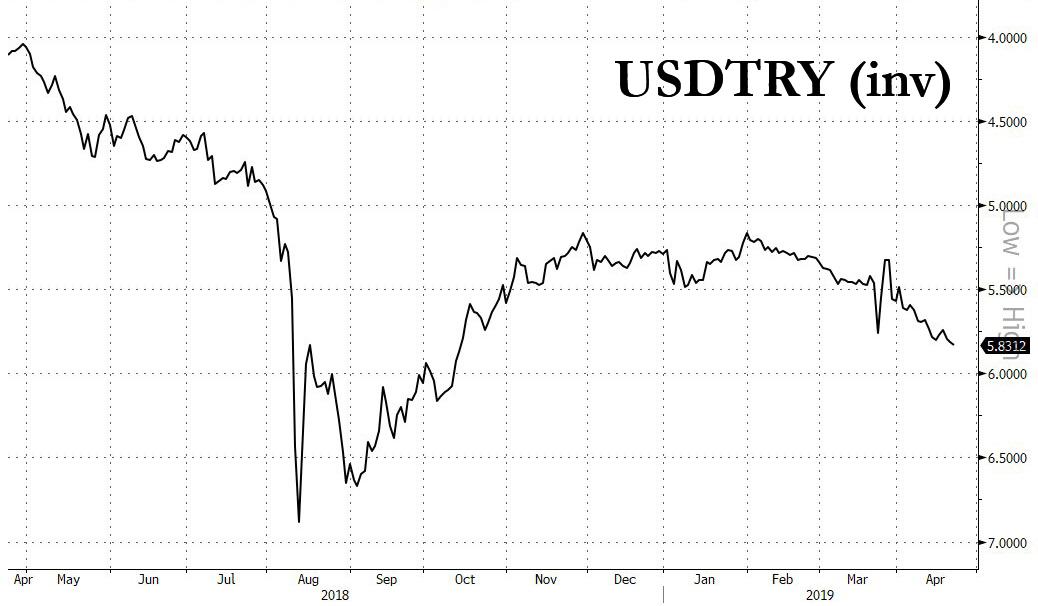Just days after the shenanigans of the Turkish central bank were exposed for the entire world to see, when as the FT reported – at great danger to its Turkish subscriptions and the freedom of its reporters in Turkey – that the country’s real FX reserves of $12 billion were half of the $24 billion represented if one stripped $12 billion in short-term swap-based borrowings from local central banks…
… which in turn sent the Lira tumbling to fresh 7 month lows, Turkey’s “executive” President Erdogan was confronted with a rare and unexpected sign of rebellion within the ruling party as former allies attacked his leadership following a sharp deterioration in the economy and historic losses in local elections last month.
The attack was launched by none other than Ahmet Davutoglu, once Erdogan’s handpicked successor to head the ruling AK Party, who said it “must face the reality of decreasing public support” due to “arrogant” (i.e., Erdogan’s) policies. And while the former prime minister’s written statement published on Monday avoided any direct or personal criticism of Erdogan, it was quite clear whom he was referring to when he ripped into policies under the president from the management of economy to curbing of basic liberties and the pressure on free speech.
“We can’t manage the economic crisis that’s in play by denying its existence,” said Davutoglu, still an AKP member, if no longer a member parliament, adding that “a governance crisis lies at the root of the economic crisis that we are living“, aiming right for Erdogan’s head and and inviting immediate arrest for daring to criticize Turkey’s dictator president.
As Bloomberg notes, Davutoglu’s willingness to launch such a broadside attack underscores the turmoil in Turkey as Erdogan tries to keep control of the political narrative and smother any sign of opposition. Boosting the former PM’s confidence in issuing what is in effect a challenge to Erdogan is that the Turkish president and his party find themselves in uncharted waters after unprecedented losses in large cities, including Istanbul and Ankara. Meanwhile, and even more concerning, is that the economy is on a knife edge because of a plunge in the currency and the looming threat of more U.S. sanctions. If Turkey’s reserves are indeed down to the lower teens as the FT calculated, that would suggest that an IMF bailout of Turkey is not a question of if but when.
* * *
In his letter, Davutoglu warned against drifting away from free market economics, and warned that the AKP’s electoral alliance with ultra-nationalists is making the governing party a hostage to a smaller political group.
Understandably, Turkey’s pro-government media gave no air time to Davutoglu’s call for reform, although at least he has not been arrested yet. To be sure, in daring to criticize Erdogan, Davutoglu faces a leader who has repeatedly if not triumphed over, then at least incarcerated powerful opponents and “survived” a fake coup attempt in 2016.
But where Davutoglu may have signed his own death sentence, either figuratively or literally, is that Erdogan has repeatedly warned members of his party not to commit “treason” and he has shown no sign of tolerance to any sign of dissent within the party in the past.
Nihat Ali Ozcan, a strategist at the Ankara-based Economic Policy Research Foundation of Turkey, said Davutoglu was doomed to fail. “Davutoglu certainly does not have the capacity or influence either over the party or AK Party supporters to challenge Erdogan’s rule,” he said by phone. “Erdogan still calls the shots over the party and is likely to do so.”
Or, as Emerson (allegedly) said, “If you come at the king, you best not miss”, and judging by the context of the former PM’s actions, he already missed. Indeed, it’s not clear what support Davutoglu has or where the the public criticism might lead, according to Bloomberg. The rebellion could provide an opening for members of a party that’s feeling increasingly restless over the economy and the alliance with nationalist party MHP.
Alternatively, Davutoglu may have more noble ambitions, especially if he is willing to be “martyred” in his unprecedented challenge of Erdogan. Indeed, as Bloomberg notes, if Erdogan chooses demonize critics (or arrest them) instead of addressing them, the internal opposition could find itself forced to set up a an alternative political party, the person said.
Whatever happens, Erdogan remains faced with trying to recover from the loss of key cities in March 31 municipal elections. The defeat in Istanbul, where Erdogan made his political career, is disputed by the president’s top aides. On Monday, Turkey’s highest electoral body is expected to start evaluating whether to nullify the Istanbul municipal election results and hold the new vote demanded by AKP.
Ekrem Imamoglu of the opposition CHP assumed the office of Istanbul mayor on April 17 after being awarded the victory, sending the lira surging. The next day, though, the currency tumbled as much as 1.9 percent against the dollar on reports that the central bank was using short-term borrowing to bolster its foreign reserves.
Meanwhile, international investors are watching all the recent developments in Turkey with great angst, and have been quietly selling the lira into every new scandal. And speaking of the Turkish currency, it was already the biggest decliner in the world this month before today’s surge in oil prices which is only adding to Turkey’s list of headaches. The lira dropped as much as 0.8% to 5.8454 per dollar, bringing its loss in April to almost 5%, although trading has been thin as some markets are closed in Europe due to public holidays.
That said, the lira’s one-month implied volatility of about 25% is the highest in the world, and traders are more bearish on the currency than any other tracked by Bloomberg. And judging by the continued chaos in Turkey, they have every reason to be.
via ZeroHedge News http://bit.ly/2Psr5LK Tyler Durden

